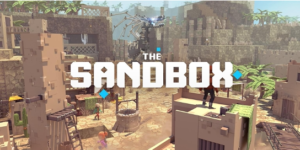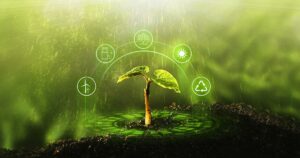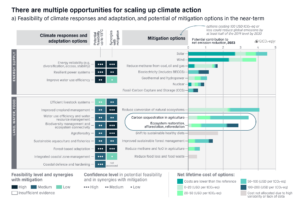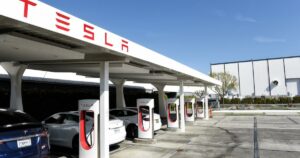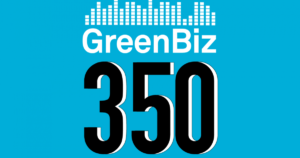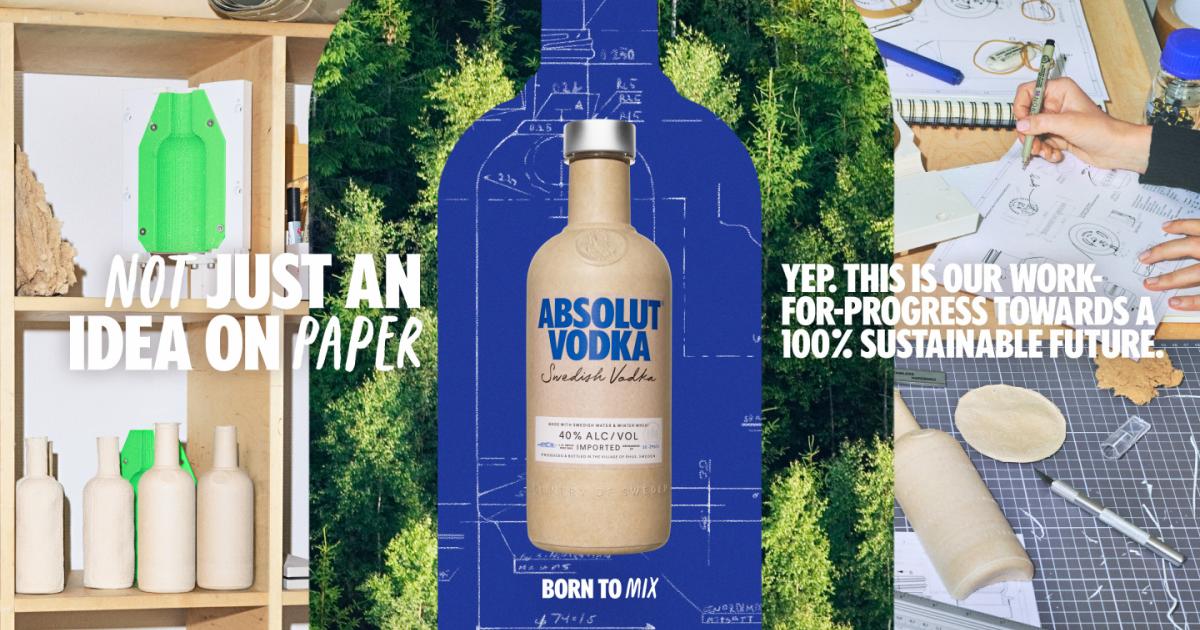
Under what circumstances will consumers buy vodka in a paper bottle, rather than glass? How will retailers merchandise this option? Will people know how to recycle the containers once they are empty?
Those are three questions that iconic brand Absolut is exploring this summer in the U.K. city of Manchester with a special 500-milliliter paper bottle sold in select Tesco stores.
The project is part of an ongoing collaboration between four consumer brands giants — Coca-Cola, Carlsberg, Procter & Gamble and L’Oreal — and a packaging venture called Paboco (The Paper Bottle Company). The quartet of brands is part of a “Pioneer Community” working with Paboco, a joint venture created several years ago between Swedish paper packaging company BillerudKorsnäs and Austrian plastic packaging producer Alpla to explore the potential benefits of paper versus other material options, including glass, aluminum and plastic.
The brands all have slightly different agendas and have been testing various paper bottle prototypes for the better part of a decade, but this is the first time a paper-based bottle has been commercially offered in U.K. stores by a global spirits company, according to Absolut. It’s a limited run (the company didn’t disclose how many were produced), so when they’re gone, the trial will be over.
Absolut previously distributed samples of a different product, its Mixt ready-to-drink beverage, at festivals in the U.K. and Sweden. There’s a big difference in the alcohol content between that product and the vodka — 5 percent alcohol by volume (ABV) for Mixt versus 40 percent ABV for vodka — and that’s one factor that Absolut will be studying. The company had to ensure that the packaging didn’t have an effect on the vodka’s taste.
“This launch is a valuable opportunity to measure insights on the bottle’s practical implementation within a real-world system,” said Elin Furelid, director of future packaging for Absolut, which is part of Pernod Ricard, the world’s second-largest wine and spirits producer.
A bottle designed to travel light
One reason Absolut chose the summer months to test this particular bottle was because it is lighter than glass alternatives and easier for people to carry around — an empty 500ml glass bottle weighs 403 grams versus 46 grams for the paper one. “The bottle is ideal for out-of-home use, not only as it is lighter but it is less likely to break so it can be used for traveling, festivals and picnics,” Furelid said.
The paper bottles are priced about $20.30, versus $25.40 for a 700ml glass bottle, so that is one factor that will be evaluated.
Absolut will also be calculating the transportation impact on its distribution channel of the lighter material, which it said has a lower carbon footprint than standard glass bottles.
The upside of paper = an established recycling network
The bottles are made out of wood fibers certified by the Forest Stewardship Council, and they contain an integrated moisture barrier to prevent the liquid from leaking through. Technically, 85 percent of the packaging is paper; the rest is made out of a high-density polyethylene that Paboco said is as “recyclable a paper packaging.” The longer-term goal is for a completely bio-based product. Right now, the company makes two sizes of the bottle — 500ml and 330ml — that brands can customize and use.
Absolut invested considerable effort in talking up the bottle on its social media channels. One thing it focused on: Making sure consumers knew that these containers, even though they looked different, were just as recyclable as glass — and that they could be placed within traditional paper and cardboard recycling bins.
The city of Manchester was chosen for this test because it had the recycling infrastructure to handle the bottles. It also has a higher household recycling rate than other regions in the U.K. at about 50 percent compared with England’s 44 percent national average, Furelid said.
Absolut is collecting feedback from consumers, retailers and distributors, and it will use those metrics to make further refinements to the packaging.
“To us, success means invoking real and long-lasting behavioral change both within the industry and with consumers,” Furelid said. “This is why it has been so important to create a product that not only generates excitement but also increases awareness of sustainability and gives consumers options that meet their needs. We believe it will be unlikely that one material will replace all but instead that consumers will use a mix of packaging that is sustainably made and recyclable.”
Paboco is by no means the only company working on paper bottles. Keep your eyes on British company Frugalpac. It recently inked a contract with Monterey Wine Co., which plans to use its packaging. Frugal Bottles are made from 94 percent recycled paperboard, with a food grade pouch. They weigh 83 grams unfilled, about five times lighter than the glass alternative. The packaging is currently being used for about 120 types of wines, spirits and olive oils. It also has “bottle filling” facilities in Australia, Canada, France, Italy, Scandinavia, South Africa, Spain and the U.K.
Editor’s note: Absolut has promised to share lessons it learned from the Paboco bottle trial this fall. Watch GreenBiz.com for an update on its future plans.
- SEO Powered Content & PR Distribution. Get Amplified Today.
- PlatoData.Network Vertical Generative Ai. Empower Yourself. Access Here.
- PlatoAiStream. Web3 Intelligence. Knowledge Amplified. Access Here.
- PlatoESG. Automotive / EVs, Carbon, CleanTech, Energy, Environment, Solar, Waste Management. Access Here.
- PlatoHealth. Biotech and Clinical Trials Intelligence. Access Here.
- ChartPrime. Elevate your Trading Game with ChartPrime. Access Here.
- BlockOffsets. Modernizing Environmental Offset Ownership. Access Here.
- Source: https://www.greenbiz.com/article/wine-box-works-absolut-asks-why-not-vodka-paper-bottle
- :has
- :is
- :not
- $UP
- 30
- 40
- 46
- 50
- a
- About
- According
- africa
- ago
- Alcohol
- All
- also
- alternative
- alternatives
- an
- and
- ARE
- around
- AS
- At
- Australia
- austrian
- average
- awareness
- barrier
- BE
- because
- been
- being
- believe
- benefits
- Better
- between
- BEVERAGE
- Big
- both
- Box
- brand
- brands
- Break
- British
- but
- buy
- by
- calculating
- called
- CAN
- Canada
- carbon
- carbon footprint
- carry
- Certified
- change
- Channel
- chose
- chosen
- circumstances
- City
- CO
- coca-cola
- collaboration
- Collecting
- COM
- commercially
- community
- company
- compared
- completely
- considerable
- consumer
- Consumers
- Containers
- content
- contract
- could
- Council
- create
- created
- Currently
- customize
- designed
- difference
- different
- Director
- Disclose
- distributed
- distribution
- distributors
- easier
- effect
- effort
- England’s
- ensure
- established
- Ether (ETH)
- evaluated
- Even
- Excitement
- explore
- Exploring
- Eyes
- facilities
- factor
- Fall
- feedback
- festivals
- filling
- First
- first time
- five
- focused
- food
- Footprint
- For
- forest
- four
- France
- from
- further
- future
- Gamble
- generates
- giants
- gives
- glass
- Global
- goal
- gone
- grade
- Grams
- had
- handle
- Have
- higher
- household
- How
- How To
- HTTPS
- iconic
- ideal
- Impact
- implementation
- important
- in
- Including
- Increases
- industry
- Infrastructure
- inked
- insights
- instead
- integrated
- invested
- IT
- Italy
- ITS
- joint
- joint venture
- jpg
- just
- Keep
- Know
- launch
- learned
- less
- Lessons
- lighter
- likely
- Limited
- Liquid
- looked
- lower
- made
- make
- MAKES
- Making
- manchester
- many
- material
- means
- measure
- Media
- Meet
- merchandise
- Metrics
- mix
- months
- National
- needs
- no
- now
- of
- offered
- oils
- on
- once
- ONE
- ongoing
- only
- Opportunity
- Option
- Options
- Other
- out
- over
- packaging
- Paper
- paper-based
- part
- particular
- People
- percent
- pioneer
- plans
- plastic
- plato
- Plato Data Intelligence
- PlatoData
- potential
- Practical
- prevent
- previously
- Produced
- producer
- Product
- project
- promised
- prototypes
- Questions
- Rate
- rather
- real
- real world
- reason
- recently
- recycling
- regions
- replace
- REST
- retailers
- right
- Run
- Said
- second-largest
- several
- Share
- sizes
- slightly different
- So
- Social
- social media
- sold
- South
- South Africa
- Spain
- special
- standard
- Stewardship
- stores
- Studying
- success
- summer
- sure
- Sustainability
- sustainably
- Sweden
- Swedish
- system
- taste
- technically
- Tesco
- test
- than
- that
- The
- their
- These
- they
- thing
- this
- those
- though?
- three
- Through
- time
- times
- to
- traditional
- transportation
- travel
- Traveling
- trial
- two
- types
- U.K.
- unlikely
- Update
- Upside
- us
- use
- used
- Valuable
- various
- venture
- Versus
- volume
- was
- Watch
- we
- weigh
- weighs
- were
- What
- when
- which
- why
- will
- WINE
- with
- within
- wood
- working
- works
- world’s
- years
- Your
- zephyrnet

